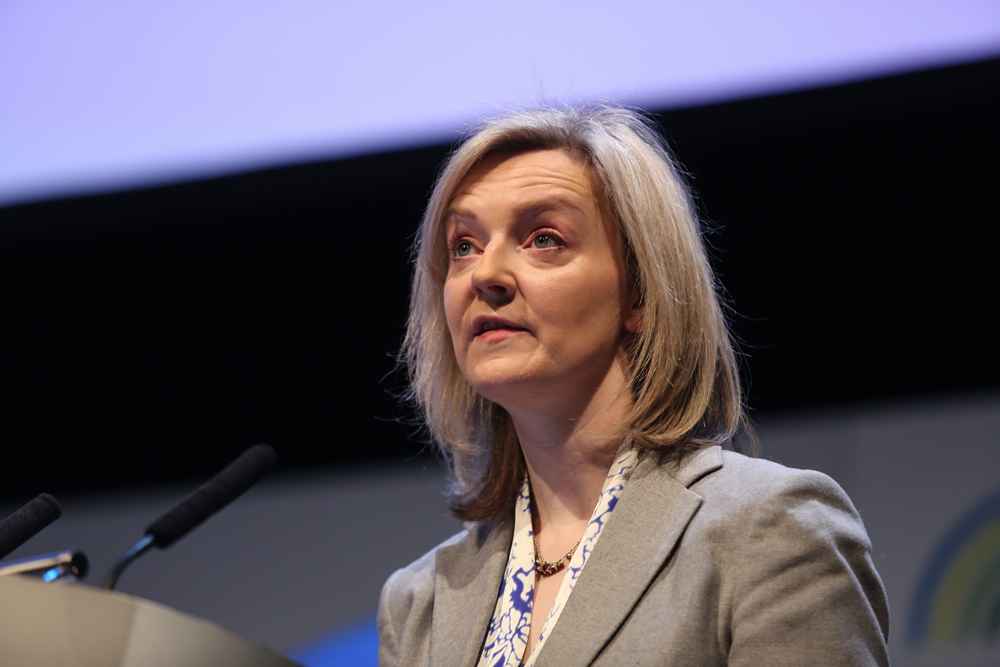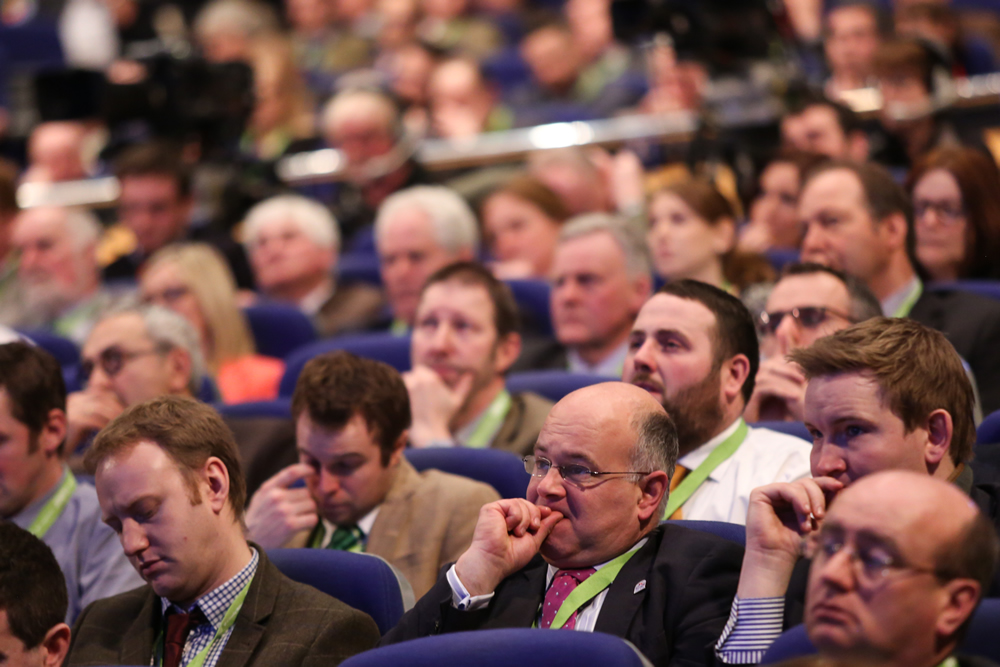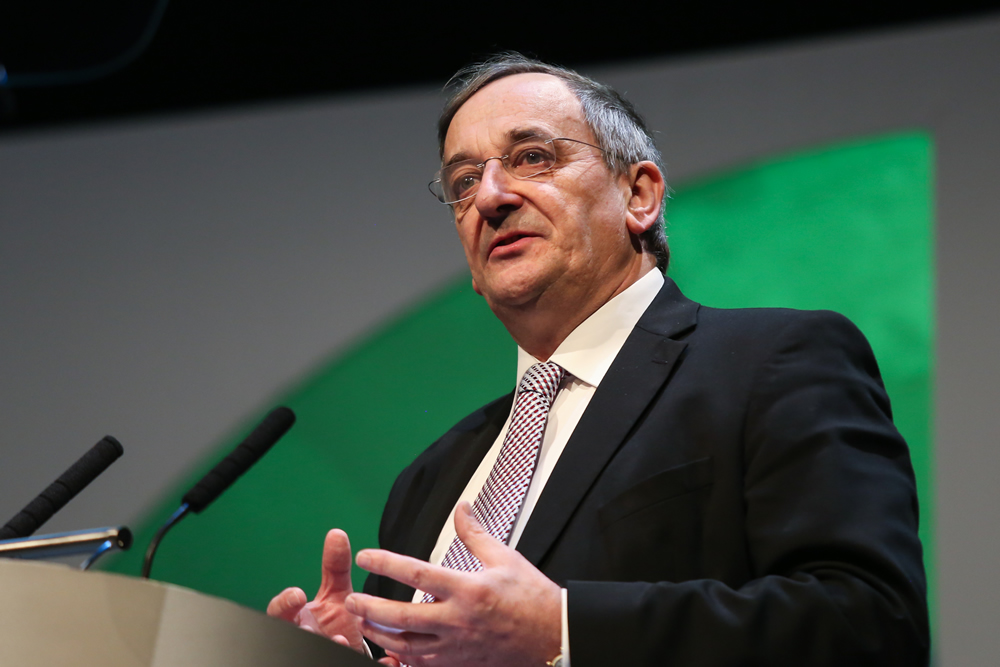
Defra Secretary Elizabeth Truss launched into the referendum debate at the annual conference of the National Farmers Union (NFU) when she said it was in farmers’ best interests to remain in the European Union. But UKIP MEP Stuart Agnew – a free range egg producer – said that Britain had nothing to fear from leaving and was perfectly capable of running its own affairs.
The Secretary of State for Environment, Food and Rural Affairs told those attending the conference in Birmingham that some 60 per cent of the United Kingdom’s food and farming exports went to the EU. The trade with the EU was worth billions of pounds to the British agricultural industry, she said.
“If you look at the exports of British food and farming products to Europe, it’s £11 billion a year – it’s a massive market. And by being a part of the European Union we are able to influence those rules. If we were to leave we would most probably, or definitely, have to follow the rules if we wanted full access to the single market. We would likely also have to accept free movement of labour and pay into the European Union,” she said. “That is a really vital market for many parts of British farming.”
The Secretary of State said that farmers currently had unfettered access to a market of 500 million people: “I think that’s really important.”

She said that the UK was still negotiating to regain access to the United States for British beef – 20 years after BSE. “We are currently working to get access for British beef to the US, to get access for poultry to China. I know how long and painstaking getting rid of some of the tariff barriers can be, because it is not just about the free trade agreement.
“Once you have got the free trade agreement, we know with a lot of farming products you need a separate agreement, you need things like inspections to the plant that we operate, you need inspections to the farms – that is a whole load of work. I am hopeful that we are going to get there with the US on beef – and it’s a big priority this year. We simply don’t want to be in a position of renegotiating now right across the board.”
British farming at a disadvantage

NFU president Meurig Raymond also expressed concern about UK farmers losing access to the single market: “The thought of renegotiating with all those countries and the tariffs would be quite an interesting exercise, to say the least. I think British farming would be at a disadvantage if we were to lose that single market access.”
He said that the NFU was working with a Dutch university, looking into what would be required in each sector of UK agriculture to ensure it did not become uncompetitive if the British people were to vote to leave the EU in the June referendum. He hoped that work would be completed in the next few weeks.
The Government’s team at Defra is divided on the issue of the European Union. Whilst Elizabeth Truss is campaigning in favour of the EU, George Eustice has joined Conservative colleagues who believe independence would be a better option. “I have been an advocate of renegotiation for fifteen years but, in the end, despite the endeavours of David Cameron, the sort of fundamental reform I wanted to see was not possible,” he said.
“I have therefore come to the conclusion that the only way to deliver the change I want to see is to vote leave, end the supremacy of EU law and replace our membership of the EU with a new UK-EU partnership instead.” Elizabeth Truss’s predecessor as Secretary of State, Owen Paterson, is also amongst those who believe that the UK should leave the EU.
Departing CAP
Divisions were also clear during a poultry breakout session at the NFU conference. Conservative MEP Julie Girling said she would vote to remain a member of the EU, and James Hook of P.D. Hook said his business was reliant on workers from other European countries. But Stuart Agnew, who produces free range eggs in East Anglia and who is the UKIP MEP for East of England, said the UK would be better off out. “The UK ran a huge trade deficit with the rest of the EU”, he said.
The benefits of farming subsidies had reduced and, for poultry farmers, there were no subsidies at all. He said that the Common Agricultural Policy had been generous to farmers between 1972 and 1984. “Ever since then we have been on a steady downhill slide of increasing regulation, and the support for the industry is getting harder and harder for farmers to get at. That’s why 20 per cent of them are still waiting for it” he said, referring to delays in the Basic Payment Scheme. The Secretary of State was repeatedly challenged about problems with the system during her speech.
Stuart Agnew said: “We have had the best of it. It’s now time to depart the CAP. It’s not fit for purpose; 28 countries – you are going to north of the Arctic Circle with commercial reindeer farming, down to a Mediterranean island where people are following clapped out draft oxen with a wooden plough, or to here in the UK with 550 horsepower tractors. You cannot get a common market in that situation.
“She talks about a leap in the dark,” he said, referring to a warning from the Secretary of State about leaving the EU. “I would suggest that when Turkey joins the European Union that’s an extraordinary leap in the dark where we open our doors to another 80 million people who are a completely different culture to us.
“We have got a nine-pound-an-hour living wage. Well that to them is the top 10 per cent of earners. We can’t cope like that, we really can’t. Yes, it may increase our population and our customer base but it is going to give us an enormous housing problem, a big infrastructure problem with not only housing but with hospitals and, dare I say it, prisons,” he said.
“Here today we were talking about poultry and how we need all this free movement of labour. I would disagree. You do not have to throw your doors open to, at the moment, 480 million people just to get a few people to work in agriculture. Alongside those who work in agriculture, you have got criminals, traffickers, people who are carrying infectious diseases, people who have murdered other people. All we need is a work permit system. It’s not really very difficult where the employer sponsors the individual who comes to work, agrees to accommodate them, guarantee their good conduct and make sure they return when they finish.”
He explained workers who were already here would be able to stay, so farmers were not going to lose their existing labour.
Stuart Agnew said other member countries would want to carry on trading with the UK if it was to leave the EU because the UK was an important market: “We have a big, big trading deficit with the European Union. In everything it is £79 billion a year – that’s an enormous amount of money. But agricultural goods do reflect that – it’s about £7 billion, I think, the deficit. In other words, we buy £7 billion more of agricultural goods from the European Union than we sell to them.
“So this business of a leap in the dark is simply nonsense. They are going to want our custom. They are desperate for our custom. £32 billion of that £79 billion is with Germany. A lot of that is cars. If Angela Merkel was to walk into the BM works and say, ‘By the way, chaps, I’m going to have a trade war with Britain,’ they would not let her out of their alive. It’s as simple as that.”
